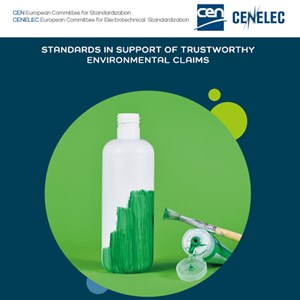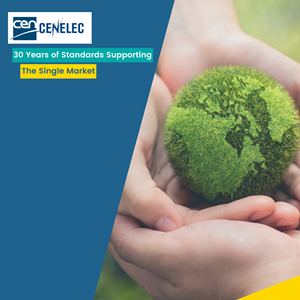NEWS

A new joint CEN-CENELEC Workshop is being established which builds on the aims of the EU-funded CIRC-UITS project. This initiative is part of Europe’s strategy to reduce dependency on extra-EU supplies of strategic products by improving the circularity of the automotive and mass electronics sectors.

CEN and CENELEC have provided recommendations to the European Commission’s Call for Evidence on how standardization can support the goals of the Water Resilience Strategy.

As the European Commission launches the Clean Industrial Deal, a transformative initiative aimed at accelerating the green transition across Europe’s industrial sector, two words come to mind: sustainable and competitive.

Consumers often struggle to decipher labels that claim sustainability or outline a product’s environmental impact. With greenwashing on the rise, misleading claims can make it difficult to distinguish truly sustainable choices from marketing spin. To address this, CEN and CENELEC have released a new brochure that helps organizations achieve their environmental goals while providing consumers with clearer, more verifiable information.

A new CEN Workshop is being established to build upon the innovative outcomes of the VARCITIES European Project (VISIONARY NATURE BASED ACTIONS FOR HEALTH, WELLBEING & RESILIENCE IN CITIES). The project’s vision is to implement visionary solutions in cities, creating sustainable models aimed at improving the health and well-being of citizens facing diverse climatic conditions and urban challenges.

The CEN-CENELEC Adaptation to Climate Change Coordination Group (ACC-CG) is pleased to announce that it has resumed its vital work after a period of inactivity.

The 28th United Nations Climate Change (COP 28) is taking place from the 30 November to 12 December 2023. To welcome this opportunity to make progress in the global effort towards fighting climate change, CEN and CENELEC look at the standards that are contributing to a greener Single Market.

On 7 September, in collaboration with the German Federal Ministry for Economic Affairs and Climate Action, CEN and CENELEC's German members, DIN and DKE, hosted a conference on “Standardization – a strategic instrument for climate action and the global digital energy transition”, in the framework of the German Presidency of G7.

Another step on Europe’s path to circularity has been taken – and European standards have a key role to play. On 2 August 2022, the European Commission notified to CEN and CENELEC the new Standardization Request on plastics recycling and recycled plastics, in support of the European Strategy for Plastics in a Circular Economy. The Standardization Request – welcomed by CEN and CENELEC Technical Boards – is the result of two intense years of cooperation with the European Commission and the relevant stakeholders.

Brussels 24 May 2022 - Nature-based solutions are promising tools to help reduce the impact of climate change and contribute to the EU’s environmental objectives. A stakeholders’ workshop organised by CEN and CENELEC on Monday 23 May explored their many challenges and opportunities and discussed how standardization can support their successful implementation.